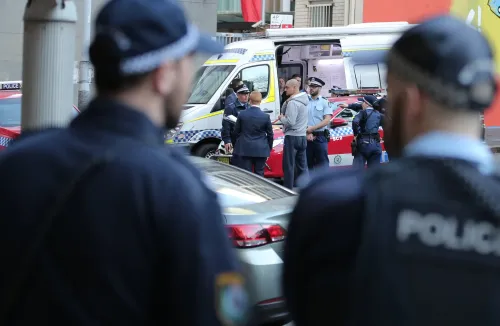Is Bangladesh a 'Failed State' Under Yunus, and Are Terrorists Ripe to Exploit It?

Synopsis
Key Takeaways
- Muhammad Yunus has transitioned from economist to interim leader.
- Bangladesh faces a potential shift from secular democracy to a theocratic state.
- The government shows signs of becoming a failed state.
- Minorities are increasingly vulnerable amidst rising violence.
- Inflation is spiraling, impacting the daily lives of citizens.
- Foreign relations with India have soured significantly.
- The interim government has failed to fulfill basic responsibilities.
New York, Aug 1 (NationPress) The shift of Muhammad Yunus from economist to leader of Bangladesh's interim government has had dire consequences for the nation. The surge of radical Islamic influence during his administration risks transforming the nation from a secular democracy into a theocratic state, according to a prominent American think tank's report released on Friday.
The political landscape under Yunus illustrates a government on the brink of becoming yet another failed state, vulnerable to terrorist activities and incapable of steering a productive course, as highlighted by the Gatestone Institute.
“Since taking office in August 2024, Yunus has overseen a country descending into political turmoil, radical Islamism, economic hardship, and social division. Bangladesh is now in a governance crisis threatening its economic viability and democratic future,” the report noted.
The Bangladesh Nationalist Party (BNP) and the Islamist party Bangladesh Jamaat-e-Islami have emerged as major beneficiaries of protests led by Students Against Discrimination, which resulted in the removal of former Prime Minister Sheikh Hasina in August 2024. Since then, the secular forces represented by Hasina's Awami League party have experienced significant backlash.
“Groups like Hizb ut-Tahrir openly advocate for a caliphate, while Hefazat-e-Islam Bangladesh, a Deobandi Islamist organization, opposes women's rights. Mufti Syed Muhammad Faizul Karim, leader of the radical Islamist Jamaat-Char Monai, has expressed intentions to enforce Sharia law and reshape the governance system in accordance with Taliban-style rule. Yunus’s government’s muted response to these demands indicates either a lack of strength or a covert endorsement of Islamization,” the report indicated.
The report elaborated on the plight of minorities, particularly Hindus, who continue to struggle for their existence in Bangladesh, underscoring the interim government's failure to safeguard them as its most significant moral failing.
“In spite of Yunus's attempts to minimize violence against Hindu minorities and other religious groups, systematic attacks on these communities have persisted and escalated. In 2024, over 100 homes and businesses belonging to the indigenous Chakma community were destroyed in Bangladesh's Chittagong Hill Tracts, with the Army failing to intervene, revealing the government's apparent complicity,” the report stated.
Moreover, despite his background as an economist, Yunus's most glaring shortcoming has been his inability to manage soaring inflation, which surged to 10.87%, up from 9.92% in September 2024, with food inflation reaching alarming levels of 14%.
“The expectation of economic revival under a Nobel Peace Prize laureate, once favored by U.S. Democratic administrations, has devolved into a nightmare for countless Bangladeshis struggling with basic needs as their purchasing power diminishes daily,” the Gatestone Institute report emphasized.
Notably, the report also highlights Yunus's failure to maintain positive relations with Bangladesh's crucial neighbor and economic ally, India, while instead pursuing closer ties with China and Pakistan.
“His frequent criticisms of India regarding various domestic issues, including floods, suggest a propensity to blame others rather than address problems directly. Concurrently, his overtures toward China and Pakistan highlight a foreign policy devoid of strategic consideration. In April 2025, Yunus invited China to establish an economic presence in Bangladesh, claiming Dhaka as the ‘sole guardian of the ocean’ in the subcontinent,” the report elaborated.
The warming relations with Pakistan, even without a formal apology for the 1971 genocide, dishonor the memories of its victims, the report added.
“As Bangladesh nears what should be a democratic transition, it finds itself increasingly divided, economically vulnerable, and internationally isolated like never before. The interim government has failed in its essential duties of ensuring law and order, protecting all citizens irrespective of religion, preserving press freedom, managing the economy, and preparing for free and fair elections,” the report concluded.
The political climate under Yunus indicates a government on the verge of becoming yet another failed state, susceptible to terrorism, and unable to forge a positive future.








